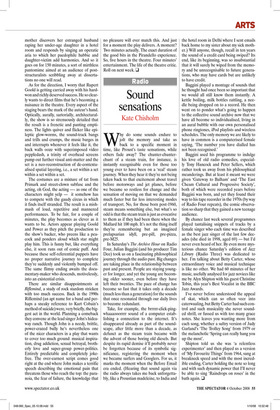Sound sensations
Kate Chisholm
Why do some sounds endure to jolt the memory and take us back to a specific moment in time, like Proust’s taste sensations, while others fade away? The chunter-chunterchunt of a steam train, for instance, is instantly recognisable even for those too young ever to have been on a ‘real’ steam journey. When they hear it they’re not being taken back to that excitement about travel before motorways and jet planes, before we became so restless for change and the sensation of moving on that we demanded much faster but far less interesting modes of transport. No, for those born post-1960, steam means something else, but what’s so odd is that the steam train is just as evocative to them as if they had been there when the Mallard hit 100 mph. It’s not the thing itself they’re remembering but an imagined prelapsarian idyll, pre-pill, pre-pizza, pre-M25.
In Saturday’s The Archive Hour on Radio Four, Julian Baggini (and his producer Tim Dee) took us on a fascinating philosophical journey through the audio past. Big changes are taking place in the relationship between past and present. People are staying younger for longer, and yet the young are becoming older sooner, even before they have left their twenties. The pace of change has become so fast that it takes only a decade (much less than a generation) for the sounds that once resonated through our daily lives to become redundant.
Take, for example, the brrrrr-click-pingwhaaaooorrrr sound of a computer establishing a connection to the internet. It’s disappeared already as part of the soundscape, after little more than a decade, as defunct as the steam train became with the advent of those boring old diesels. But despite its rapid demise it’ll probably never be forgotten because of its symbolic significance, registering the moment when we became surfers and Googlers. For us, it marks the moment when the Before Email era ended. (Hearing that sound again via the radio always takes me back unforgettably, like a Proustian madeleine, to India and the hotel room in Delhi where I sent emails back home to my sister about my sick mother.) Will anyone, though, recall in ten years the sound of a credit card being swiped? Its end, like its beginning, was so insubstantial that it will surely be wiped from the memory and be unrecognisable to future generations, who may have cards but are unlikely to have credit.
Baggini played a montage of sounds that he thought had once been so important that we would all still know them instantly. A kettle boiling, milk bottles rattling, a needle being dropped on to a record. He then went on to ponder what’s going to happen to the collective sound archive now that we have all become so individualised, living in an aural bubble with our own personalised phone ringtones, iPod playlists and wireless schedules. The only memory we are likely to have in common is a computerised female saying, ‘The number you have dialled has not been recognised.’ Baggini used his programme to indulge his love of old radio comedies, especially Tony Hancock and Peter Sellers, which rather took us away from his philosophical meanderings. But at least it meant we were given ‘Gateway to Balham’ and ‘The East Cheam Cultural and Progressive Society’, both of which were recorded years before Baggini was born, and yet they found their way to his tape recorder in the 1970s (by way of Radio Four repeats), the comic observation so sharp that they gained a new teenage audience.
By chance last week several programmes played tantalising snippets of tracks by a female singer who each time was described as the best jazz singer of the last few decades (she died in 1998, aged 69) — but I’d never even heard of her. By even more mysterious chance Saturday’s edition of Jazz Library (Radio Three) was dedicated to her. I’m talking about Betty Carter, whose extraordinary voice and musical technique is like no other. We had 60 minutes of her music, usefully analysed for jazz novices like me by Alyn Shipton with his guest Christine Tobin, this year’s Best Vocalist in the BBC Jazz Awards.
I’ve never before understood the appeal of skat, which can so often veer into caterwauling, but Betty Carter had such control and such musicality she never sounded shrill, or fussed us with too many grace notes. She leaves you wanting more from each song, whether a sultry version of Judy Garland’s ‘The Trolley Song’ from 1979 or the melancholic ‘Spring can really hang you up the most’.
Shipton told us she was ‘a relentless experimenter’ and then played us a version of ‘My Favourite Things’ from 1964, sung at breakneck speed and with the most incredible ending, Carter holding the note so long and with such dynamic power that I’ll never be able to sing ‘Raindrops on roses’ in the bath again. ❑










































































 Previous page
Previous page